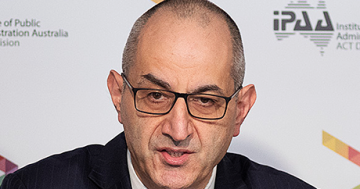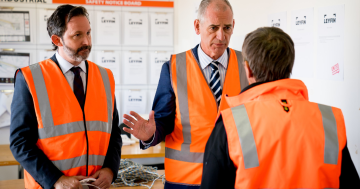
Former Defence secretary Dennis Richardson investigated contracts issued by Home Affairs. Photo: ADF.
Katy Gallagher says it’s full steam ahead when it comes to reforming the public service to boost its integrity and capability.
Appearing before Senate Estimates, the Public Service Minister said slashing the high price tag of external consultants to the Australian Public Service meant better use of in-house expertise and knowledge and was a high priority for the government.
So, too, is reducing conflicts of interest in procurement and appointments.
APS agencies have clear directions about seeking external advice, when it’s appropriate and when it should be dealt with in-house.
“Obviously, entities are accountable for their own procurement decisions, so it’s advice they have to interpret through their decision-making,” Senator Gallagher said.
“The guidance around managing conflicts of interest is pretty clear, but if there are other areas we should be looking at to enhance that, we’re open to that conversation.”
During his estimates appearance, Australian Public Service Commissioner Gordon de Brouwer said about two dozen public servants were currently under investigation for possible breaches of the APS Code of Conduct.
These include the 15 remaining people referred to him over behaviour concerning the failed and illegal Robodebt scheme.
“I understand public commentary questioning the level of secrecy around code of conduct investigations and the time that they can take … I welcome public scrutiny,” the Commissioner said.
“The Commission works hard to conduct investigations properly in accord with all the dimensions of the law and the public’s expectations of accountability for the service’s actions.”
Meanwhile, Department of Home Affairs Secretary Stephanie Foster faced a grilling over her agency’s failures in due diligence with offshore processing contracts when the Coalition was in government.
Former Defence secretary Dennis Richardson’s review of Home Affairs’ management of the contracts, following a media report last year alleging they were rife with corruption, was delivered in October but only released publicly on Monday (12 February).
Mr Richardson found that: “Proper due diligence was lacking when it came to contracts with relatively small companies with limited or no public profile, and where operations were to be in a high-risk environment.”
The review noted, however, that it “did not come across any matter of deliberate wrongdoing or criminality” and that it did not find any evidence of ministerial involvement.
“It is possible that, even with access to the information available within government agencies, Home Affairs may have had no option but to enter into contracts with these companies,” the review stated.
“Certainly, the department was operating within an environment of high pressure where time was often of the essence.
“However, with proper due diligence, Home Affairs could have considered alternative suppliers and, if this was not possible, the implementation of mitigating measures. But this was not done.
“Intelligence and other information, which was readily available, was not accessed. As a consequence, integrity risks were not identified.”
In this week’s estimates, Greens senator Nick McKim raised concerns that public servants involved had not been identified.
However, Ms Foster said the department’s procurement processes involved many areas, making it challenging to identify specific individuals responsible for the due diligence failures.
“There was, you know, an overarching procurement process, there was the regional processing team itself executing the contract, there was an intelligence area who was or wasn’t feeding information into the contracting process,” she said.
“And I don’t want to verbal [Dennis Richardson], but my understanding is that he did not feel that it was productive to go back in time and seek to unravel that.”
Senator McKim suggested it was an “egregious failure of process” and “utter incompetence” not to be able to identify wrongdoers inside the department.



















